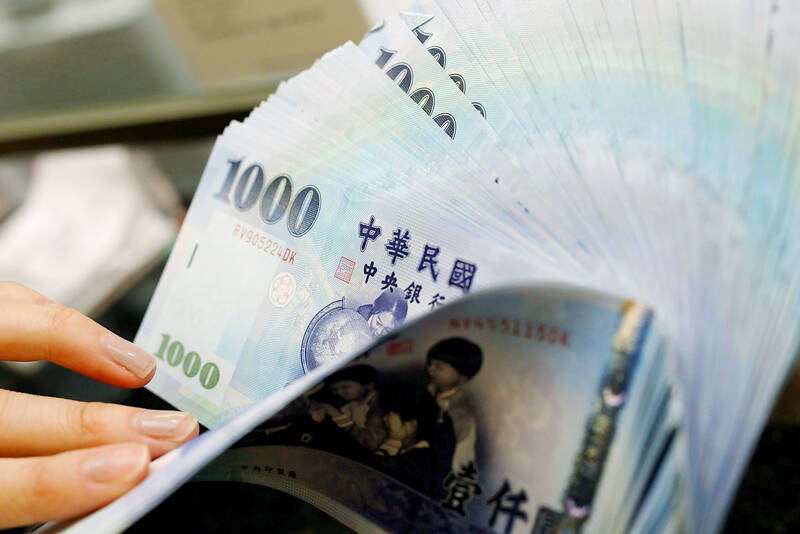From April 10 to Friday last week, Meta Platforms Inc and Google Taiwan removed a combined 1,363 scam investment advertisements from their platforms, the Financial Supervisory Commission said yesterday, as it warned of the continuing prevalence of fraudulent information.
That compares with the 39 scam ads they deleted a month earlier, the commission said.
During the period, the commission detected 1,615 ads that were highly likely to be scams to Meta, the owner of Facebook and Instagram, and Meta removed about 83 percent of them, or 1,338 ads, it said.

Photo: Tyrone Su, Reuters
The commission found 105 suspicious ads on Google during the same period, with Google deleting 25 ads, or 24 percent of the total, it said.
Even though Google has a lower cancelation ratio, the company is willing to cooperate with the commission in fighting fraud and conducts an internal examination before removing suspicious posts, the commission said.
The scam ads mostly feature fake endorsements by celebrities or executives of big financial companies as well as stock analyses, and invite platform visitors to join messaging groups, the commission said.
Cathay Financial Holding Co (國泰金控) chairman Tsai Hung-tu (蔡宏圖), Cathay Securities Investment Trust Co (國泰投信) chairman Jeff Chang (張錫), SinoPac Financial lead economist Jack Huang (黃蔭基) and CTBC Bank retail banking CEO Amy Yang (楊淑惠) have been featured in the fake ads, data showed.
Besides partnering with online platforms, the commission said it is to tighten the Securities Investment Trust and Consulting Act (證券投資信託及顧問法) to curb investment misinformation.
Advertisements must not entice people to invest or guarantee returns, use the name of celebrities and other people or organizations without their consent, while companies or individuals must use their real names when applying to post ads on online platforms, the commission said.
Online platforms would be held liable if advertisements are found to be fraudulent and lead to losses for consumers, it said.

Vincent Wei led fellow Singaporean farmers around an empty Malaysian plot, laying out plans for a greenhouse and rows of leafy vegetables. What he pitched was not just space for crops, but a lifeline for growers struggling to make ends meet in a city-state with high prices and little vacant land. The future agriculture hub is part of a joint special economic zone launched last year by the two neighbors, expected to cost US$123 million and produce 10,000 tonnes of fresh produce annually. It is attracting Singaporean farmers with promises of cheaper land, labor and energy just over the border.

US actor Matthew McConaughey has filed recordings of his image and voice with US patent authorities to protect them from unauthorized usage by artificial intelligence (AI) platforms, a representative said earlier this week. Several video clips and audio recordings were registered by the commercial arm of the Just Keep Livin’ Foundation, a non-profit created by the Oscar-winning actor and his wife, Camila, according to the US Patent and Trademark Office database. Many artists are increasingly concerned about the uncontrolled use of their image via generative AI since the rollout of ChatGPT and other AI-powered tools. Several US states have adopted

A proposed billionaires’ tax in California has ignited a political uproar in Silicon Valley, with tech titans threatening to leave the state while California Governor Gavin Newsom of the Democratic Party maneuvers to defeat a levy that he fears would lead to an exodus of wealth. A technology mecca, California has more billionaires than any other US state — a few hundred, by some estimates. About half its personal income tax revenue, a financial backbone in the nearly US$350 billion budget, comes from the top 1 percent of earners. A large healthcare union is attempting to place a proposal before

KEEPING UP: The acquisition of a cleanroom in Taiwan would enable Micron to increase production in a market where demand continues to outpace supply, a Micron official said Micron Technology Inc has signed a letter of intent to buy a fabrication site in Taiwan from Powerchip Semiconductor Manufacturing Corp (力積電) for US$1.8 billion to expand its production of memory chips. Micron would take control of the P5 site in Miaoli County’s Tongluo Township (銅鑼) and plans to ramp up DRAM production in phases after the transaction closes in the second quarter, the company said in a statement on Saturday. The acquisition includes an existing 12 inch fab cleanroom of 27,871m2 and would further position Micron to address growing global demand for memory solutions, the company said. Micron expects the transaction to